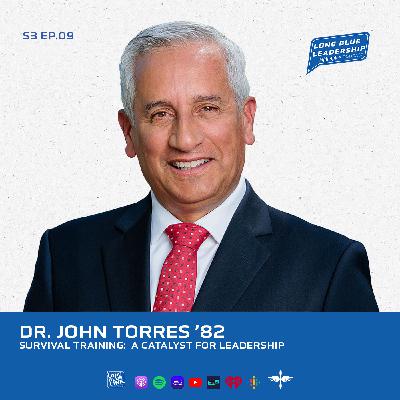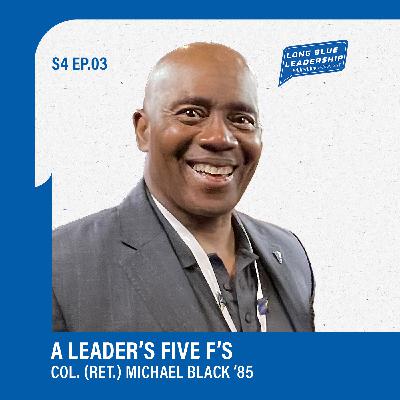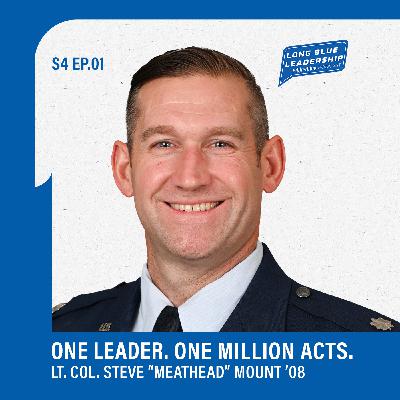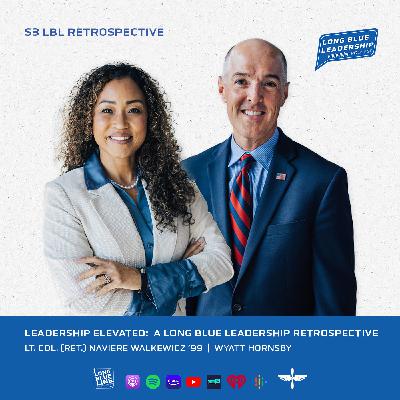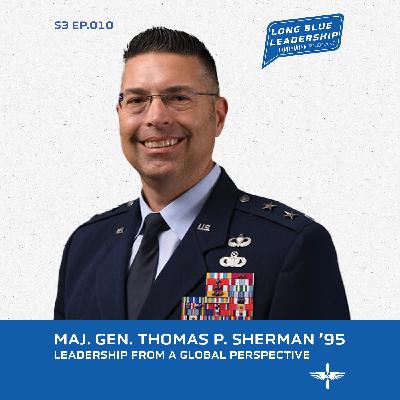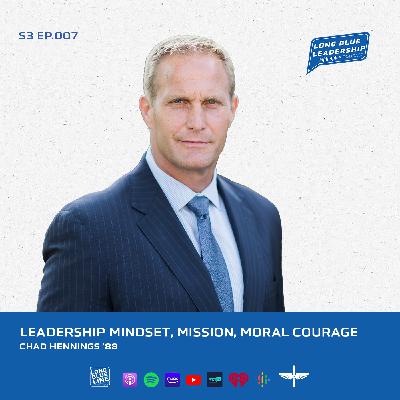Survival Training: A Catalyst for Leadership - Dr. John Torres ’82
Description
In this episode of Long Blue Leadership, Dr. John Torres shares his inspiring journey from being the first in his family to attend college to becoming NBC's senior medical correspondent.
SUMMARY
Dr. Torres discusses the challenges he faced at the Air Force Academy, the pivotal moments that shaped his leadership skills, and the influence of his family values. He reflects on his unconventional experiences, including survival training and falconry, and how these experiences prepared him for a successful career in medicine and media. His story is a testament to resilience, curiosity, and the importance of mentorship in leadership. In this conversation, he shares his journey from dealing with hantavirus outbreaks in New Mexico to becoming a prominent medical correspondent during the pandemic. Dr. Torres discuss the challenges of communicating complex medical information to the public, the importance of empathy when delivering bad news, and the role of family support in his career. Finally, he emphasizes the need for continuous improvement in leadership and the value of instilling positive values in the next generation.
SHARE THIS EPISODE
DR. TORRES' TOP 10 LEADERSHIP TAKEAWAYS
- Lead with empathy: Understand where people are coming from, recognizing that anger often stems from fear and underlying concerns.
- Communicate clearly: Break down complex information into understandable terms, whether speaking to patients, soldiers, or the public.
- Be willing to admit mistakes: True leadership means having the courage to acknowledge when you're wrong and take responsibility.
- Develop a "no excuse" mentality: Take ownership of situations, even when they're not entirely your fault.
- Build trust through peer-to-peer interactions: Treat people as equals rather than using an authoritarian approach.
- Continuously learn and adapt: Stay current in your field and be open to new experiences and perspectives.
- Support your team's individual growth: Encourage people to pursue their passions and provide guidance without pressure.
- Match your emotional delivery to your message: Ensure your communication is authentic and appropriate to the content.
- Lead by example: Demonstrate the values and work ethic you expect from others through your own actions.
- Focus on purpose over position: Leadership is about making a positive impact and helping others grow, not about title or status.
CHAPTERS
00:00 Introduction to Dr. John Torres
02:01 Overcoming Challenges at the Academy
05:03 Discovering Leadership Through Survival Training
08:33 Influence of Family Values on Leadership
10:42 Unconventional Experiences at the Academy
13:41 Transitioning from Pilot to Medical Doctor
20:06 Lessons Learned as a Flight Doc
23:58 Becoming an NBC Correspondent
24:37 Hantavirus and Early Medical Experiences
26:00 Transitioning to Media: From ER to TV
27:23 The Pandemic: A Super Bowl for Medicine
29:05 Communicating Medical Information Effectively
32:29 Delivering Bad News with Compassion
34:41 Teaching NATO Special Forces Medics
37:02 Family Support and Legacy
39:58 Instilling Values in the Next Generation
41:56 Continuous Improvement as a Leader
45:52 Final Thoughts and Future Aspirations
ABOUT DR. TORRES
BIO
Dr. John Torres ’82 is currently Senior Medical Correspondent for NBC News and a graduate of the United States Air Force Academy. With a career spanning more than 30 years in emergency medicine, military service, and national media, Dr. Torres brings a rare blend of clinical expertise, crisis leadership, and public communication to every role he takes on. Before joining NBC, he served in the Air Force, deploying to combat zones and responding to humanitarian crises around the globe.
After retiring from the military, Dr. Torres transitioned to civilian emergency medicine and later began sharing trusted medical insights with millions of viewers through his work in broadcast journalism. On camera and off, he is known for making complex medical issues accessible and relevant, especially during moments of national concern like the COVID-19 pandemic.
A seasoned leader shaped by experience in the field, the ER, and the newsroom, Dr. Torres exemplifies the values of service, clarity under pressure, and lifelong learning—principles he credits in large part to his upbringing in rural New Mexico, foundational Academy education and military experiences.
CONNECT WITH DR. TORRES
ALL PAST LBL EPISODES | ALL LBLPN PRODUCTIONS
AVAILABLE ON ALL MAJOR PODCAST PLATFORMS
TRANSCRIPT
SPEAKERS: Guest, Dr. John Torres ’82 | Host, Lt. Col. (Ret.) Naviere Walkewicz ’99
Naviere Walkewicz 00:11
Welcome to Long Blue Leadership, the podcast where we share insights on leadership through the lives and experiences of Air Force Academy graduates. I'm Naviere Walkewicz, Class of ’99. In this edition of Long Blue Leadership, we're joined by someone whose journey is as inspiring as it is unconventional — Dr. John Torres, USAFA Class of ’82. You might know him as NBC’s senior medical correspondent, but long before he was delivering public health insights to millions of viewers on national television, he started military life as a young cadet at our Air Force Academy, navigating his own path of purpose and transformation. Dr. Torres story begins with life in a tight-knit Latino family with roots in northern New Mexico extending back to the 1500s, where he became the first in his family to go to college. He entered the Academy from a high school where gangs and drugs were common, but it was a structure at USAFA and one pivotal summer of survival training that lit a fire in him as a pilot. Dr. Torres discovered a calling beyond the cockpit, thanks in part to a chance conversation on a three-hour flight, leading him to medicine, where he would serve as a flight doc for more than two decades. Dr. Torres’ leadership story extends beyond the emergency room, whether mentoring NATO's special forces medics, stepping in front of a camera to deliver critical public health guidance, or reflecting on 43 years of marriage, he is fueled by his relentless curiosity about all things possible. I'm honored to welcome Dr. John Torres to Long Blue Leadership. His is a path that reminds us that leadership is a series of grounded values and bold steps. Dr. Torres, welcome to Long Blue Leadership.
Dr. John Torres
Thanks for having me here.
Naviere Walkewicz
Absolutely. We're really excited to jump in. And I want to go back to something we talked about. You were the first in your family to go to college. However, there was a period of time where you might have left the Academy. Can we jump right in there.
Dr. John Torres 02:01
It's actually pretty interesting, because intuitively, it doesn't make sense for anybody that went through it, but it was my first year as a doolie year, as anybody who's gone through the doolie year, it's a tough year to go through, especially— you come out of high school. I remember I had hair down to my shoulders, and you come in here, they shave it off right away, and your parents leave, and you're sad, and everybody's sitting there going through the same stuff, but at same time, you know, it's just a tough thing to go through. And so I went through that. I went through basic training, and I was kind of like, “I don't know if this is really where I want to be.” I started the Academy. I went to school, like you mentioned, a high school— it wasn't one of the best high schools in the country by any stretch of imagination. So when I came here, it was kind of an eye-opener, because I had— I was here with people who had gone to very good high schools, and so I was a step behind academically, so I had to catch up as well through that. And so that made it a little bit tougher. So not just physically, not just mentally, academically, everything was kind of, you know, just tough that year and something as a 18-year-old, you're not used to a 19-year-old. And so I started looking at other schools, thinking I want to leave. And I talked to my dad, and he was an amazing person. He's always been one of my heroes in my life. And my dad, surprisingly, didn't say anything. He didn't say, like, “You need to stay there.” You know, he was an Air Force— he retired Air Force, and you know, he really was proud that I was here, but at the same time, thankfully, he just said, “You know, you nee

